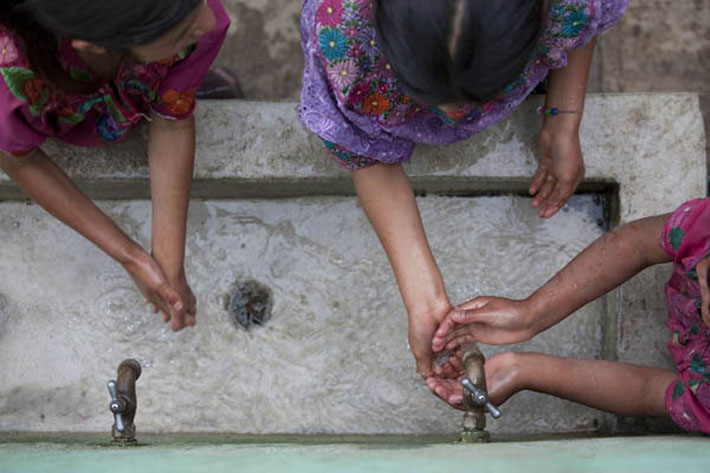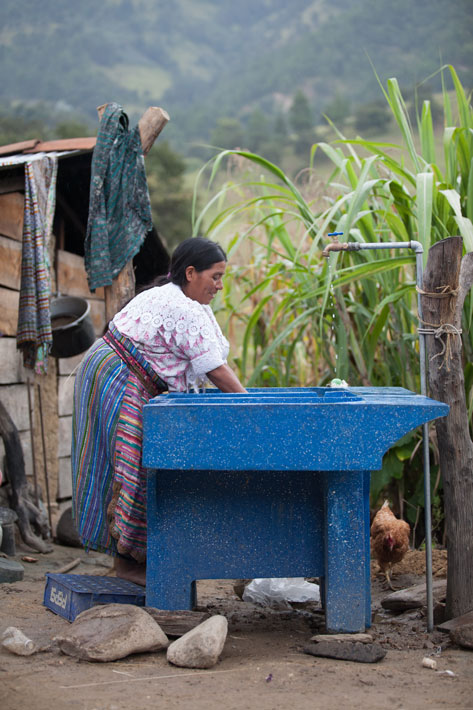Universal access to safe water in Latin America? How is this possible to achieve in a region where some of the most beautiful tourist destinations in the world have signs in hotels reminding me not to drink the tap water? Loco!
Most countries in Latin America achieved their Millennium Development Goal targets for water by 2015, and some did so also for sanitation. This means the number of people without access to safe water dropped by half from 2000 to 2015. The bar lifted though in late 2015 with the adoption of the Sustainable Development Goals (SDGs), which challenge countries to ensure sustainable management of water and sanitation for all by 2030. Water For People supports governments in Guatemala, Honduras, Nicaragua, Peru, and Bolivia to create systems-change initiatives to enable these countries to achieve this ambitious goal.

Water For People promotes the development of high-quality drinking water and sanitation services, accessible to all, and sustained by strong communities, businesses, and governments. Our impact model is called Everyone Forever, which means we aim to reach every family, clinic, and school with reliable and lasting access to safe water and sanitation services that will last for generations.
Relative to the immense challenge of sustainable services—of the “Forever” half of Water For People’s Everyone Forever impact model—getting service to Everyone might seem easy enough. Some might say, “Just give some engineers some money and get to work!” But it’s not so easy.
We have identified several key barriers to universal access with our local partners:
Operating under an “Everyone” mindset changes everything at the local level. “Everyone” and SDG 6 force us to stop thinking in terms of “their project” vs. “our project,” but rather to take a district-wide approach. With such an approach, all projects belong to the communities and local governments and must be sustained regardless of whether the original donor or implementer remains locally active. “Everyone” commitments force local governments to break down these barriers and seek solutions for all communities.

How Water For People reaches Everyone in five Latin American countries:
Everyone in Honduras
In 2011, the small, rural district of Chinda in Honduras was the first of the districts where Water For People works to reach every community—15 in total—with reliable water service through a piped water system. More recent household-level surveys, however, identified that some of the population did not have household access, despite access at the community level. Water For People partners with the Inter-American Development Bank (IDB) and IRC to pilot models to reach this population.
In 2013, in part due to the achievement in Chinda, the national Everyone Forever movement, Para Todos Por Siempre (PTPS), was created alongside national and international NGOs and two key national government agencies. PTPS has expanded the push toward universal and sustainable access beyond the three districts supported by Water For People to 30 districts nationwide. Today, PTPS serves as the best model in Latin America of the principles of Agenda For Change, which has created collective impact models in eight countries globally with support from Water For People, WaterAid, IRC, AguaConsult, and the Osprey Foundation.
Everyone in Bolivia
In 2012, the small, rural district of Cuchumuela became the first district in Bolivia to reach full household coverage for reliable water service—an achievement confirmed by a complete census of the district. The Vice-Minister for Drinking Water and Sanitation also traveled to Cuchumuela and randomly visited several communities to confirm the achievement. In 2015, the district of San Pedro reached Everyone at the household level, and in 2016 every community in the district of Villa Rivero attained reliable water service. Direct support from Water For People and the Everyone Forever model contributed to these successes.
At the national level, President Evo Morales has responded to this district-level progress by setting a national goal of universal access to safe water by 2025 (five years ahead of SDG 6). The Ministry of Environment and Water put a $3 billion price tag on this goal, which is affordable in a country estimated to have $15 billion of reserves. Water For People’s role in reaching President Morales’ goal is to catalyze and leverage the government investment to have high returns. With the Ministry, we’ve created the Mas Agua Para Todos Por Siempre (More Water for Everyone Forever) initiative to support the government’s goal, and we are advising the government’s work in several departments.
Everyone in Peru
In Peru last year, Pedro Pablo Kuczcinski (popularly known as PPK) was elected president. Prior to his political run, PPK founded a water nonprofit in Peru called AguaLimpia. True to his personal passions, among PPK’s campaign promises was a commitment to achieving universal access to safe water across Peru by 2021, a full nine years ahead of SDG 6. Water For People is participating in a series of meetings to help organize the water sector in Peru in alignment with PPK’s goals, building on our years of experience working in several districts in northern Peru. A new sanitation law was also passed less than two months ago, which converted PPK’s campaign promise into policy.
Everyone elsewhere in Latin America
Positive energy has sparked elsewhere in the region. In Nicaragua in late 2016, Water For People and WaterAid led a process to bring the major water sector players together to adopt common principles for achieving universal and sustainable access to safe water. In Guatemala, Water For People works with members of Congress to pass a much-needed water law considered a prerequisite to universal and sustainable access to safe water. In Panama, where Water For People has never worked, President Juan Carlos Varela has set a goal for universal access to safe water in his country by 2019.
So, will SDG 6 be achieved in Latin America? Lessons from universal access achieved in other parts of the world suggest key ingredients for success are strong, high-level government leadership, a vision of total coverage, a multi-sector approach, and continual monitoring and improving of standards and regulations. Water For People is committed to doing everything it can to support governments in the region to achieve SDG 6 by accelerating progress toward universal coverage and investing in systems to sustain that coverage for generations to come. That’s Everyone Forever in action.
Mark joined Water For People in 2008 as coordinator of a school water, sanitation, and hygiene education program implemented throughout Central America. Mark is a licensed Professional Civil Engineer and holds a Master of Science in Economics, Finance, and Management from the Barcelona Graduate School of Economics, where he was a Rotary Ambassadorial Scholar. Mark is a Returned Peace Corps Volunteer, where he served in Honduras as a water and sanitation engineer, and has professional experience as a consulting engineer with HDR in Nebraska and Florida.